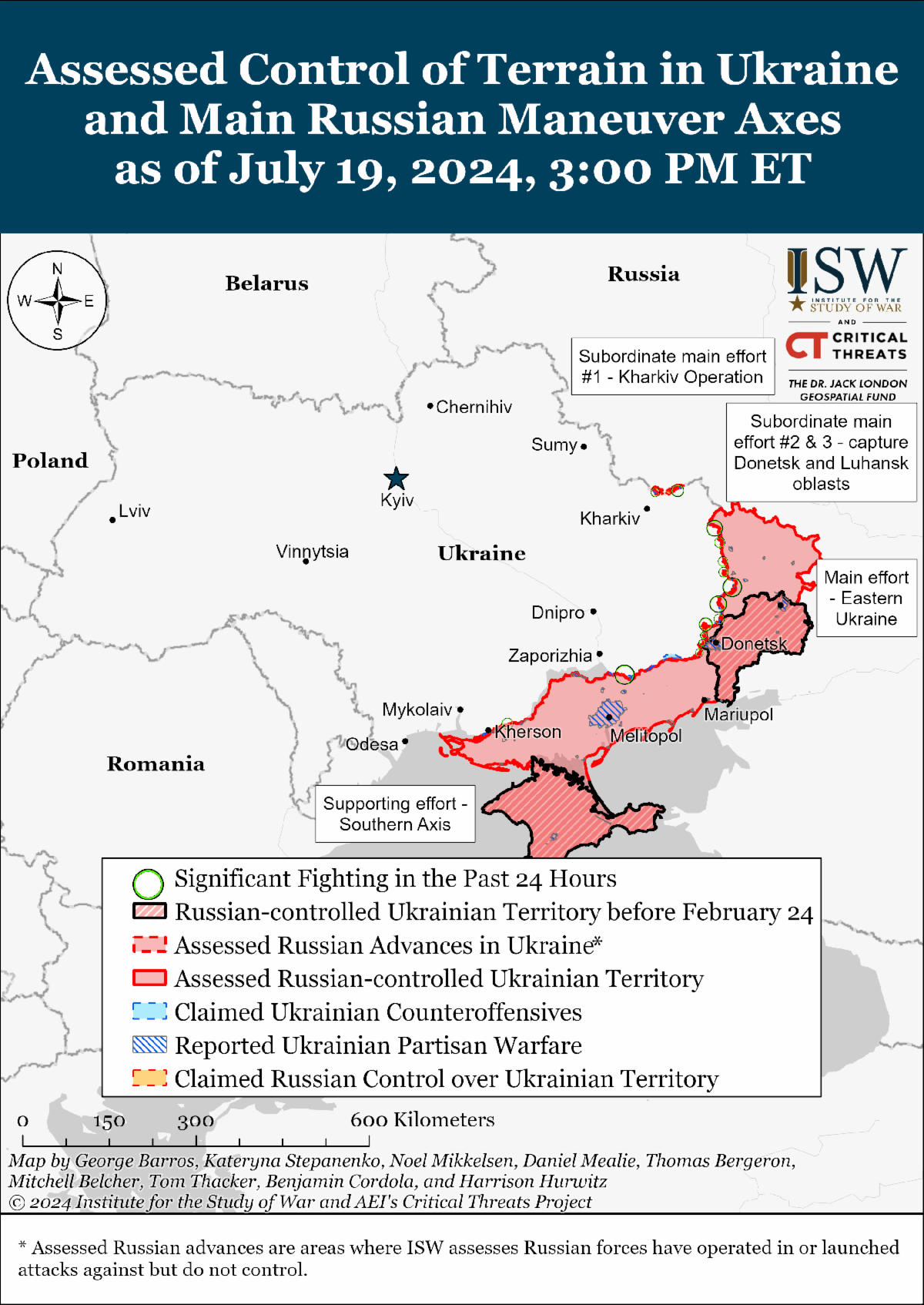Ukrainian President Volodymyr Zelensky reiterated the importance of developing an international consensus for pursuing peace negotiations to end the war in Ukraine. Zelensky stated during an interview with the BBC published on July 18 that the world needs to develop a united consensus on a possible end state for the war in Ukraine and present this consensus to Russia in order to encourage Russia to come to the negotiating table. Zelensky added that diplomacy will be an important element of restoring Ukraine's territorial integrity and that Ukraine does not necessarily need to liberate all of its territory "by force" but must significantly weaken Russia's battlefield position in order to develop a stronger negotiating position for future peace negotiations. Zelensky and other Ukrainian officials have consistently presented their vision for a negotiated settlement for the war in Ukraine, which includes the restoration of Ukraine's territorial integrity and long-term security guarantees for Ukraine's sovereignty and national security against future aggression. Ukrainian officials have not articulated a willingness to concede territory to Russia in exchange for peace, and Zelensky's statements are consistent with this position. Ukrainian officials continue to signal their willingness to participate in good faith peace negotiations with Russian representatives based on Ukrainian sovereignty, territorial integrity, and international law, and Kremlin officials continue to frame such negotiations as outlandish and an "ultimatum" and call for a settlement tantamount to Ukrainian surrender.
Hungarian Prime Minister Viktor Orban appears to be augmenting several Russian information operations amid continued efforts to present himself as a possible future mediator between Russia and Ukraine. Orban published a report on July 18 detailing his recent "peacekeeping mission" and visits to Ukraine, Russia, China, Turkey, and the United States. Orban notably conceded that Russia, as a belligerent, is uninterested in a ceasefire or peace negotiations with Ukraine, an admission at odds with Kremlin officials’ efforts to pose Russia as amenable to peace negotiations. Kremlin officials have also undermined their efforts to sue for peace by repeatedly signaling an unwillingness to participate in negotiations based on anything less than complete Ukrainian capitulation. Orban may have acknowledged Russia's resistance to negotiations in order to appear impartial as he tries to present himself as a possible mediator. Orban simultaneously attempted to place the onus for negotiations on Ukraine and questioned the longevity of US and European support for Ukraine, both of which are consistent with ongoing Russian information operations intended to discourage Western support for Ukraine and absolve Russia of responsibility for an invasion that Russia started. Orban also called for the European Union (EU) to normalize diplomatic relations and reopen lines of communication with Russia. The Kremlin is attempting to use diplomatic meetings, including meetings with Hungary, to create the impression that Russia is normalizing relations with the West and claim that there is limited Western support for Russia, and Orban's recommendation would support this Kremlin effort and undermine several years of EU policy to address Russian war crimes and aggression towards Ukraine. Orban stated on July 19 that his "peace mission" will continue despite recent criticism from EU leadership and efforts to demonstrate the EU's non-alignment with Orban's positions on Ukraine and peace negotiations.
Key Takeaways:
- Ukrainian President Volodymyr Zelensky reiterated the importance of developing an international consensus for pursuing peace negotiations to end the war in Ukraine.
- Hungarian Prime Minister Viktor Orban appears to be augmenting several Russian information operations amid continued efforts to present himself as a possible future mediator between Russia and Ukraine.
- New United Kingdom (UK) Defense Secretary John Healey stated on July 19 that Ukraine can use UK-provided weapons to strike military targets in Russia, despite previous reports that the UK had not permitted Ukraine to use UK-supplied Storm Shadow missiles to strike military targets within Russia.
- The Kremlin is reportedly concerned about the long-term social and political implications of Russian veterans returning from the war in Ukraine.
- The Russian government is reportedly considering stricter measures to directly censor critical voices on Russian social media.
- Russian authorities continue to propose stricter migration legislation as Russia's ultranationalists continue to espouse xenophobic rhetoric and complain about the Russian government's perceived lenient migration policy.
- Russian forces recently advanced near Siversk, Toretsk, and Avdiivka.
- Disorganization continues to plague Russian efforts to integrate personnel who served in Russian proxy forces in occupied Ukraine into the Russian military bureaucracy.
| 




 [ISW] 이스라엘-하마스 전쟁(이란) 업데이트, 2024년 7월 20일
[ISW] 이스라엘-하마스 전쟁(이란) 업데이트, 2024년 7월 20일
 [ISW] 이스라엘-하마스 전쟁(이란) 업데이트, 2024년 7월 19일
[ISW] 이스라엘-하마스 전쟁(이란) 업데이트, 2024년 7월 19일